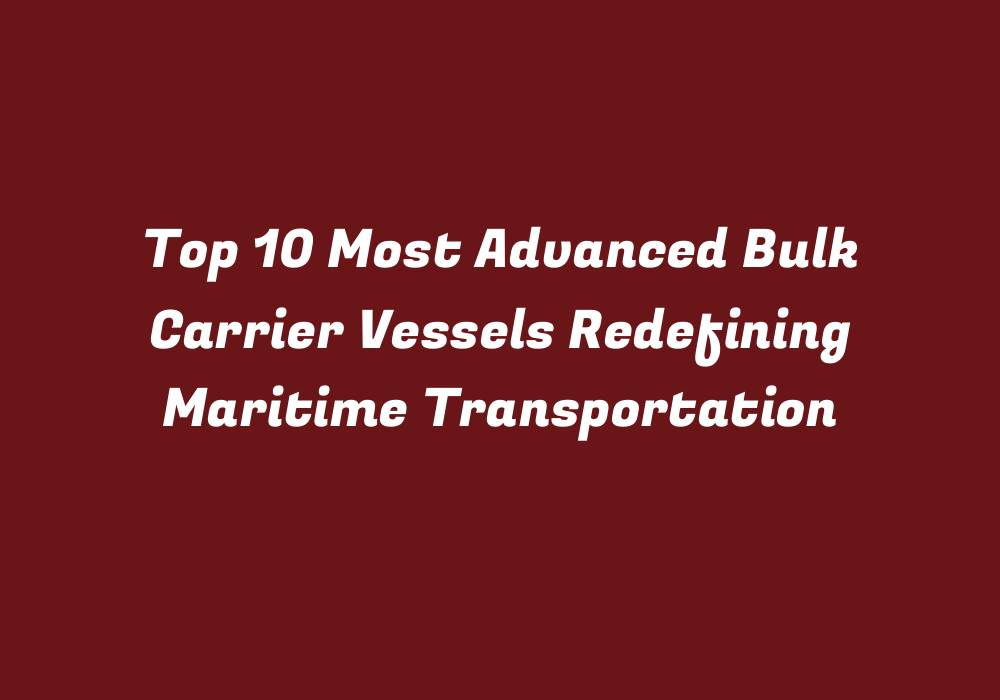Introduction
In the ever-evolving world of maritime transportation, bulk carrier vessels play a significant role in transporting raw materials and commodities across the globe. These cargo carriers have undergone numerous technological advancements over the years to enhance their efficiency, safety, and environmental friendliness. Here are the top 10 most advanced bulk carrier vessels redefining maritime transportation:
1. CMA CGM ABU DHABI
CMA CGM ABU DHABI is a modern ultra-large container ship owned by French shipping company CMA CGM. Commissioned in 2018, this vessel boasts a capacity of up to 23,000 twenty-foot equivalent units (TEUs). The ABU DHABI features energy-efficient designs and technologies that optimize fuel consumption and reduce emissions. With a length of nearly 400 meters, it is one of the largest container ships in the world.
2. MOL Triumph
The MOL Triumph, operated by Japanese shipping company Mitsui O.S.K Lines, is another cutting-edge bulk carrier vessel. Launched in 2015, it has a carrying capacity of 76,800 deadweight tonnes (DWT). The vessel is notable for its innovative bow design that enhances fuel efficiency and reduces greenhouse gas emissions, making it one of the world’s cleanest bulk carriers.
3. Valemax Class Tankers
The Valemax class of tankers is a series of ultra-large ore carriers developed by Brazilian mining company Vale S.A. Designed for transporting large volumes of iron ore, these vessels are 362 meters long and have a capacity of up to 400,000 DWT. The Valemax class has been instrumental in increasing the efficiency and sustainability of the iron ore transportation industry.
4. MSC Gulsun
MSC Gulsun is the first of seven ultra-large container vessels being built by Italian shipbuilder Fincantieri for Mediterranean Shipping Company (MSC). With a capacity of 23,000 TEUs, the vessel boasts various green technologies that help reduce fuel consumption and emissions, such as a hull design optimized to minimize resistance and a propulsion system that minimizes engine vibrations.
5. Eco-Friendly Bulk Carriers
Bulk carrier vessels are not limited to the few examples mentioned above; many other bulk carriers are also designed with environmental friendliness in mind. These environmentally friendly vessels use advanced technologies and materials that reduce carbon footprint, such as dual fuel engines powered by liquefied natural gas (LNG), energy-efficient propulsion systems, and smart monitoring systems that optimize operational efficiency.
6. Dual Fuel Bulk Carriers
The use of LNG as a fuel source in bulk carrier vessels has gained significant attention over the past few years due to its potential to drastically reduce harmful emissions and increase sustainability. Dual-fuel bulk carriers operate with both traditional diesel engines and LNG engines, offering flexibility while also allowing them to adapt more easily to future environmental regulations.
7. Automated Bulk Carrier Vessels
The increasing trend of automation in the maritime industry has extended its reach to bulk carrier vessels as well. As a result, we are seeing an increase in autonomous or semi-autonomous bulk carriers that rely on advanced navigation systems and artificial intelligence to facilitate their operations. This automation improves safety, efficiency, and environmental performance.
8. Hybrid Bulk Carrier Vessels
Innovative hybrid bulk carrier vessels combine traditional diesel engines with alternative power sources, such as batteries or solar panels, to create more fuel-efficient and environmentally friendly transportation solutions. These vessels utilize energy recovery systems that capture waste heat from the engine and convert it into electricity for onboard use, further enhancing their overall efficiency.
9. Smart Bulk Carrier Vessels
Smart bulk carrier vessels employ digital technologies to optimize their operations through real-time monitoring, data analysis, and remote control systems. These features enable the management of vessel performance, fuel consumption, and onboard processes for maximum efficiency while reducing operational costs and environmental impacts.
10. Green Hull Designs
Green hull designs are another emerging trend in bulk carrier vessels that reduce their overall resistance to water flow, decreasing energy consumption and greenhouse gas emissions. These eco-friendly hull designs utilize advanced materials and cutting-edge engineering techniques to minimize drag and improve fuel efficiency.
Conclusion
The evolution of bulk carrier vessels has taken significant strides in recent years with technological advancements, environmental concerns, and a growing demand for sustainable practices in maritime transportation. By embracing innovative approaches to design, propulsion systems, automation, and hull construction, these vessels are leading the way towards a more efficient and responsible future in shipping.
